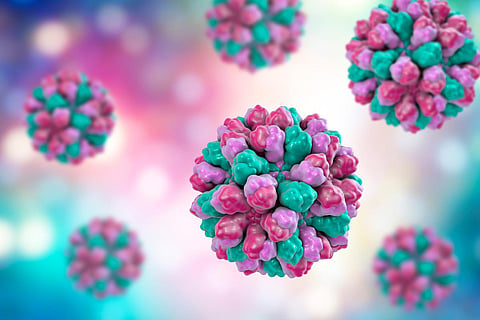THURSDAY, Jan. 16, 2025 (HealthDay News) -- As many people know all too well, norovirus is a wicked illness. It causes gastroenteritis, a fancy name for violent vomiting, intense nausea, and severe diarrhea symptoms.
Outbreaks often hit the U.S., Europe and other countries in the wintertime, when folks spend more time inside, often after traveling for end-of-year holidays.
According to the CDC, cases are being reported at higher frequencies than recent years.
"A person can get a norovirus infection at any time throughout the year, but its epidemic peaks are in the winter," Dr. Robert Atmar, infectious diseases physician and professor of medicine at Baylor College of Medicine in Houston, TX, said in a news release. "It affects people of all ages. We aren't sure why infection rates are higher [in 2025 versus years past] , but it probably has to do with the circulating strains and the lack of immunity in the population."
8 Norovirus Facts That You Need to Know Right Now
1. Norovirus is contagious. Highly contagious. You can get it from an infected person, contaminated food or water, or by touching contaminated surfaces.
2. It is usually caused by:
Eating or drinking contaminated food or water
Touching contaminated surfaces and objects or
Being in close contact with someone who already has it
3. Symptoms of norovirus, usually bouts of vomiting and diarrhea, last roughly 24 to 72 hours, or one to three days. Vomiting is the most common symptom. Once infected, people get sick and experience symptoms fairly soon.
4. You can spread it before, during, and after having symptoms.
"People are the most infectious when they have symptoms," Atmar said. "The virus can be detected in a person's stool before they develop symptoms and for at least several days after recovering from the illness, he said, adding that "Just because a person has gotten over their symptoms doesn't mean they can't potentially transmit it."
In fact, people can shed the virus for up to two weeks after having symptoms.
5. The virus lives in body fluids such as vomitus and fecal matter. Cleaning up vomit or diarrhea should include gloves and using 10% bleach to kill the virus on affected surfaces.
"People who are sick should not be preparing food for others. Even after they have recovered, if they plan to prepare food for others, they should still make sure to wash their hands," he said.
6. To treat norovirus, drink plenty of fluids to stay hydrated. There is no antiviral medication or specific drug for norovirus, but, if needed, a physician can prescribe medications to help ameliorate nausea and vomiting. Rest and stay home for about two days after symptoms stop.
7. To help protect yourself and prevent norovirus, wash your hands well and often. Especially after touching surfaces, caring for others who are sick, changing diapers, and using the bathroom, wash your hands with soap and water for about 15 seconds.
In addition, clean and disinfect contaminated surfaces. Wash laundry in hot water. Be sure to cook shellfish thoroughly and wash all fruits and vegetables.
8. There are no vaccines available to treat norovirus at this time. "Vaccines are undergoing clinical evaluation to determine if it can prevent the virus or make it milder, but this could take a few years before becoming available to the public," according to Atmar.
More information
SOURCE: Baylor College of Medicine, press release, Jan. 13, 2025; American Medical Association; CDC; WHO.


